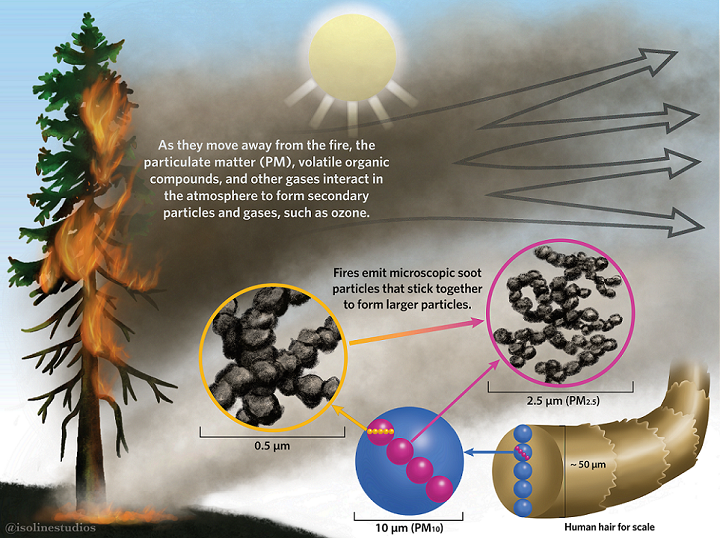Wildfires and smoke have always occurred in British Columbia, but they are becoming more frequent and severe as the climate changes. Wildfire smoke is a form of air pollution that can affect your health.
Exposure to air pollution can irritate the lungs, cause inflammation, and alter immune function.
Information available in:
ASL | 繁體中文 |
简体中文 |
Français |
ਪੰਜਾਬੀ | فارسی |
한국어 |
Español |
عربى |
Tiếng Việt
The BCCDC has created fact sheets with information about wildfire smoke and its health impacts, including information on how to prepare for wildfire season. You can view and download the fact sheets here:
*To access high-resolution versions for poster-quality colour printing, please contact: sarah.henderson@bccdc.ca.
People at higher risk
Different people respond differently to smoke, and some people are at higher risk of experiencing health effects. The BCCDC recommends the following groups of people reduce their exposure to smoke:
- People with pre-existing chronic conditions such as asthma, chronic obstructive pulmonary disease (COPD), heart disease, and diabetes
- People who are pregnant
- Infants and small children
- Elderly
- People who have been diagnosed with a respiratory infection such as COVID-19
Healthy people can be affected by wildfire smoke too. Everyone responds differently, so listen to your body and reduce your exposure if the smoke is affecting you.
Health effects of wildfire smoke
Wildfire smoke contains very small particles that travel deep into your lungs when you inhale. These particles can cause irritation and inflammation, which can last until the air quality improves. Most symptoms are relatively mild, and can be managed without medical attention:
- Sore throat
- Eye irritation
- Runny nose
- Mild cough
- Phlegm production
- Wheezy breathing
- Headaches
Some people may experience more severe symptoms and should seek prompt medical attention. Call
HealthLink BC (8-1-1), talk to your primary care physician or visit a walk-in clinic if you’re experiencing:
- Shortness of breath
- Severe cough
- Dizziness
- Chest pain
- Heart palpitations
Protect yourself from wildfire smoke
The best way to protect against the potentially harmful effects of wildfire smoke is reduce your exposure to smoke and seek cleaner air:
- Get prepared for the wildfire smoke season as you would do in any other summer.
- Use a portable HEPA air cleaner to filter the air in one area of your home
- Visit public spaces such as community centres, libraries, and shopping malls which tend to have cleaner, cooler indoor air
- Take it easy and limit outdoor exercise on smoky days because the harder you breathe, the more smoke you inhale
- Drink lots of water to help reduce inflammation
- If you are working outdoors, use an N95 respirator that has been properly fitted by occupational health and safety professionals
- Whenever possible, use air conditioners, heat pumps, evaporative coolers, fans, and window shades to keep your cleaner air space comfortably cool on hot days. Overheating can cause serious health problems
- If you have a chronic health condition, work with your health care providers to create a management plan for smoky conditions. If you use rescue medications, make sure that you have an ample supply at home and carry them with you at all times during the wildfire season
- Use the Air Quality Health Index (AQHI) to evaluate local and regional air quality conditions
- Know where to find other reliable information on wildfire smoke and air quality
People with pre-existing medical conditions should take extra precautions and should keep their rescue medications with them at all times. If you cannot get your symptoms under control, seek prompt medical attention.
The composition of wildfire smoke
Wildfire smoke is a complex mixture of gases and particles that interact and change as they move away from the fire. The individual particles in wildfire smoke are very small, but they tend to stick together as they travel away from the fire. Of all the pollutants in wildfire smoke, fine particulate matter (PM2.5) poses the greatest risk to human health.
The microscopic soot particles can be inhaled deep into the lungs, where they may cause inflammation and irritation. Volatile organic compounds and other gases can also irritate the eyes, nose, throat, and lungs.

Download and use the image. Credit: Jen Burgess/IsolineStudios for BC Centre for Disease Control.
Wildfire smoke and health surveillance dashboard
The BC Asthma Prediction System provides information about (1) observed and predicted air quality, and (2) observed and predicted asthma-related health outcomes for BC Health Service Delivery Areas (HSDAs) and Local Health Areas (LHAs). The forecast predictions cover today and tomorrow. This information is intended to help BC public health professionals and the public anticipate and prepare for wildfire smoke events.
Translated content
American Sign Language
繁體中文 (Traditional Chinese)
简体中文 (Simplified Chinese)
(Arabic) عربى
Français (French)
ਪੰਜਾਬੀ (Punjabi)
(Farsi) فارسی
한국어 (Korean)
Español (Spanish)
Tiếng Việt (Vietnamese)
